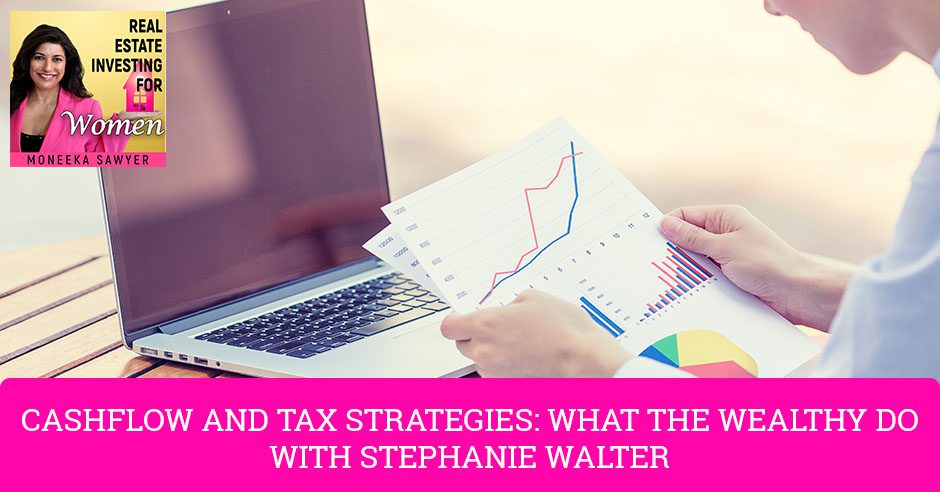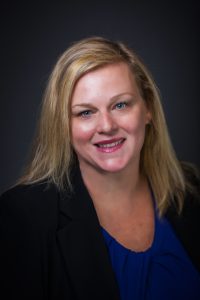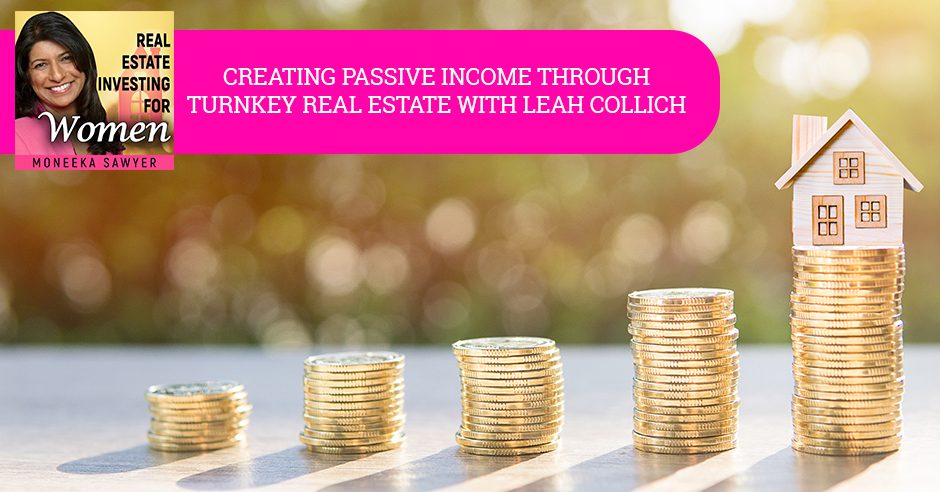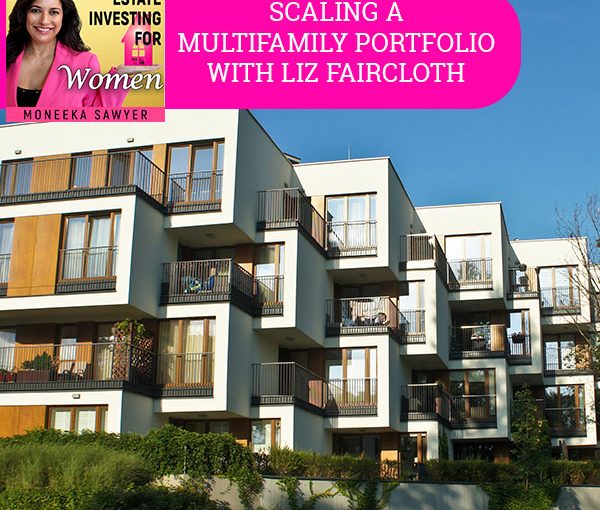Cashflow And Tax Strategies: What The Wealthy Do With Stephanie Walter – Real Estate For Women

What do the wealthy do that makes them wealthy? We find out the answer to that and more in this episode. Moneeka Sawyer is joined by the co-founder of Erbe Wealth, Stephanie Walter. Stephanie talks about breaking away from corporate America and investing in real estate. She also shares insights learned from working with wealthy people, offering great cash flow and tax strategies that can give you the push towards their direction. Tune in to learn more tips from wealthy investors.
—
Watch the episode here
Listen to the podcast here
Cashflow And Tax Strategies: What The Wealthy Do With Stephanie Walter – Real Estate For Women
Real Estate Investing For Women
I am excited to welcome to the show, Stephanie Walter. She is the CEO of Erbe Wealth and a legacy cashflow specialist, capital raiser, syndicator and real estate investor. She has been a financial educator for many years and a real estate syndicator. Stephanie’s passion is teaching people to unlearn what most of us have been wired to think about money and re-educating people on attaining wealth that can be passed on to the next generation. Stephanie, welcome to the show. How are you?
I’m great. Thank you so much for having me.
I am excited about this conversation because there are many myths, ideas and lies that we are taught about money. I hope that’s not too strong a word but it’s awesome to have somebody come on board that’s going to share some of their wisdom around this. Before we get started, could you tell us a little bit about your story like how you got to where you are?
I started like most people into the corporate world out of college and realized not too long thereafter, when I was continually getting these 2% raises that, “This was not for me.” I quit my job and started an insurance agency in 2006. I’ve always loved real estate. I never had much training to it, so I went out and bought a lot of single-family homes and learned by my mistakes and successes on how to do that.
I decided I wanted to scale up in 2016 and get some great education and learn more about possibly buying apartment complexes or commercial real estate. I got into RE Mentor, which is an education program, like getting your Master’s in Real Estate. I did that and completed my first syndication in 2016. After that, I started getting to know people and became a partner with someone who didn’t like to raise money.
I started raising money at that time. Ever since I’ve worked a lot with wealthy people, I and that’s learned a lot from working with them about how they use their money, unlearning everything we’re all taught as fact. I transitioned a lot of my assets, doing what they were doing. I sold my day business, which is insurance and I’m retired. Other than I’ll continue to raise money. I like to teach people about what I’ve learned because I believe my path is definitely doable for everybody.
Could you share with us some of these things that you learned from wealthy people? What is true about wealthy people is they do think differently about money and investing than other people. What’s also interesting is how we define wealthy. I want to give a little bit of my perspective also on this and that. I live in California and people are impressed with the income that we make and the net worth that we have, but for a Californian, we’re upper-middle class.
Wealthy people live in a pretty average house. They drive pretty average cars, but their net worth is pretty impressive. Share on XWe’re not the wealthy around here. The wealthy around here are more like Bill Gates, Bezos and Zuck. Even though I’ve had a huge education in building wealth, my dad was a great mentor even as a young person, but still, I don’t think that I even have that real wealth mindset because I’m not a wealthy person in my community. I’m eager to know about people that define themselves as wealthy. What are those things that they do differently than the rest of us?
What’s interesting about that and you probably know that from where you live is that you’re not always going to recognize a very wealthy person. A very wealthy person, a lot that I deal with, you would never know. They live in a pretty average house and drive pretty average cars but their net worth is pretty impressive. The thing that you noticed by going through their finances pretty clearly is that they invest largely in real estate.
That’s the bulk of their investments. They invest directly in businesses, not in mutual funds. If they invest in the stock, it’s usually, “I got this tip from so-and-so.” It’s almost like their fund money but what they’re very concerned with doing and what they would probably tell you is that cashflow to them is more important than net worth.
There’s a perfect example of what you’re saying in your community is that you’ve got a lot of people that probably have very significant net worth but yet they may be working paycheck to paycheck to keep that lifestyle where it is. Whereas someone who’s wealthy is very concerned with cashflow that the cash flow is building up enough.
It replaces their income so that they can do what they want and love to do to contribute to society. The biggest thing that I learned is that most wealthy people don’t talk a lot about their net worth, even though it probably is pretty impressive but cashflow to them is huge. I learned that lesson myself because I live in Colorado. Colorado’s changed a lot. I started investing here in 2005 and needless to say, the prices have gone up unimaginably.
On paper, I had a very good net worth but I still had to work and continue running my business because I did not have a cashflow strategy in place for this money and I wasn’t very concerned with what my money was doing. Wealthy people know what their money is doing for them. They want the money to be working at all times for them. They view money as a tool that is working for them. That’s a mindset thing.
Until I transition different assets around to see how they were performing and analyzing, “What is my money doing for me?” It was largely inequity and it had a return of zero. To transition that into assets that would pay cashflow, as well as have a good interest rate return, that doesn’t take long to do that to have the goal of having the cashflow for you to be able to be truly wealthy, whatever that looks like for you.

What The Wealthy Do: Most wealthy people don’t really talk a lot about their net worth, even though it is probably pretty impressive, but cash flow is huge.
Talk to me a little bit about how that might translate for people that are not yet wealthy. How can they adopt those mindsets when so much of the time so many of us are living paycheck to paycheck and trying to survive but that wealthy mindset is available to us? Could you talk to us a little bit about that?
That’s another thing that I became pretty aware of when working with wealthy people is that they have a view that money is abundant. That sounds small to people but think about your view on money. Do you view money as, “There’s only so much of it and if I take some money from someone, then I’m making someone else less wealthy?”
They view money as a stream of water and that money is always flowing, abundant and coming. I didn’t probably have a mindset about money but once I did learn about the abundance mindset, I made a point of changing that. That sounds small but if you believe that money is flowing and coming, then it gives you a different perspective on money.
You say that’s small but it’s huge. That mindset tweak is huge. I was explaining this to a friend of mine and I got this image in my head that money is a little bit, rather than being like a stream where it’s inflow, it’s more like a fountain where it comes in, goes up and down, then it comes back in. It’s this circular thing. The power of the pump that makes that go is your willingness to circulate.
I donated to a woman I met $1,000. Everybody else was donating $10. Why did I do $1,000? To me, $1,000 is part of that pump. It’s more going out. That means that more will come in. The pump is stronger because there’s more circulating. Please forgive me. I hope that didn’t sound like a brag. Don’t spend beyond your needs. I’m not saying, “Go spend a ton of money.”
I’m saying that the circulation of money is imperative to creating wealth, community and to uplifting people. Unless money is going out, they are not jobs. Unless those people are not spending, there’s not a community. There’s nothing for us to do together. This is an interactive thing. All of us benefit from the spending and earning of money.
It’s not a zero-sum game this. Even for me, I came home and I was like, “That was such a great visual.” I want a strong pump in that fountain so that the circulation of that wealth is bigger, impacts more, stronger and more fun for me too. I like a powerful fountain. Does that sound right to you or do you feel like something is in there that doesn’t work?
Cash flow is more important than net worth. Share on XThat’s a great analogy. Something that offshoots from is that, granted there are stereotypes and all of that but wealthy people I meet that have been successful are very giving. It’s that same abundance mindset. There’s plenty for me to help you get. What I find very interesting about wealthy people, as opposed to the average person who does the 401(k), is they put their money into this because they’re told that’s what they need to do, a wealthy person invests their money teams of people and ideas.
Let’s use real estate as an example. They find a project that is compelling and interesting. They’ll do their due diligence but they’ll look for a team that has experience who has proven themselves to be successful. Then they’ll put their money into that team, step back and let the team do their thing. They’ll check in on the reports but largely, they’re passive.
Wealthy people invest in business plans and directly in the business. Whereas, us with a 401(k), who knows where our money is invested in? It’s invested in maybe thousands of companies that we know nothing about. They’ll invest their money directly in a business, someone’s business and, “What is this person’s business plan?”
It’s the same thing. They do all their due diligence but they invest directly to people and in people, more than a 401(k) or throwing your money out there and hoping that it grows but you’re not sure what you’re invested in. The wealthy are very conscious of who they’re investing in, where their money is and what it’s doing at all times.
Would you say that approach is true in real estate too for them?
Yes. I find that they don’t want to be the landlord and be managing. They want to understand the exit and business plan for this particular property and then they want to invest in it. They’ll sit back, review the quarterly reports, collect their monthly distributions of cashflow and do the same thing with another investment that comes along.
Talk to me a little bit about debunking these myths. What are those myths that you learned about from these people that we learn the opposite so much of the time?

What The Wealthy Do: Money is always flowing. It’s always flowing, and it’s always abundant. It’s always coming.
I’ve gone over a few of them already but big one is 401(k)s. That might not be a popular subject but I believe that we have to take a look at why we do things and if these things that have been set up for us by I’m not sure who work to our advantage or not. The thing that brought my attention to that is I look over lots of wealthy people and their financial statements. Virtually none had 401(k)s.
That was eye-opening because I was like, “What? I didn’t understand.” It didn’t compute to me. That’s a large myth and then you have to look in more closely. It makes sense because wealthy people want to know what their money is doing at any and all times. They want to know the returns that they’re generating and also what they prepare more than we do for taxes. By not preparing for taxes, that’s a huge thing that the majority of people don’t do.
If someone tells you how much they have in their 401(k), do they have that much in their 401(k)? In twenty years, what is the tax rate going to be and how much of what they have is going to be taxed? To simply not address your tax and mitigate for your taxes, it’s something that the wealthy do all the time. I use the analogy of these two people playing a game of chess and the regular Joe investor is looking one move at a time.
He’s looking, “How are my investments doing? What is the return?” While the wealthy person is looking several moves ahead. They’re checking, “How are my investments doing? On the other hand, what is my exit strategy? How can I mitigate for my taxes?” They’re looking side by side for income and taxes. That is why wealthy people get wealthy.
The myth that I understand there was saving your 401(k), your taxes will be less when you are finally pulling your money out. Don’t worry about that piece. You’re doing a tax-deferred type of program and you’re going to defer it so that you’re paying taxes later. In your experience or from what you’ve seen from the wealthy people, is that true that tax rates will be lower later?
No. Any of us can see what’s happening in our country regardless of what’s happening politically. We know that we’re spending a lot of money and in a lot of debt. People may not know this but our tax rates are on the low side. Historically, they’ve been much higher than they are. We know that the tax rates are going to change in the future. Are you prepared for that?
The tax rates are going to change but I also think that people don’t want to live a lesser lifestyle when they retire. For example, personally, I’m not going to want to retire until I can have the lifestyle that I have now without the work. What does that mean for me? I’ve got this lifestyle with this house and car and this excitement and joy for travel.
Wealthy people know what their money is doing for them. And they want the money to be working at all times for them. Share on XNow I’m not working, so I’ve got more time to travel more, hang out, hopefully take care of my parents more and my own health stuff. If I’m to look at my retirement, I’m going to say, “I need 50% more than what I’m making, at least, in order to continue to benefit from those many years of work.” I don’t want to have my lifestyle go down and be able to afford less.
Whatever my retirement vehicles are, if I’m pulling more than what I’m doing now, even if tax rates stay exactly the same, my tax rate has not gone down. It’s exactly the same. I’m not paying less taxes later but same tax. If the tax rates go up, now you’re paying even more. This whole idea of deferring taxes is an okay strategy.
Be aware that you’re not going to be paying less taxes later. You tell me what you think of this. You have money going in that’s compounding without being taxed, so it happens more quickly. You’ve got more on the backend, supposedly. That’s a compounding and a great investment strategy for growth, possibly depending on what you’re doing with it but it’s not necessarily a tax strategy.
I don’t want to tell everybody to get rid of your 401(k)s. A lot of people are into them but what I do say is be aware of what returns you’re getting. What fees are you paying? I ask a lot of people and they’re not aware of these things. You’ll look at the prospectus and what they’ve made over the last years. Sometimes it’s like 3% or 4% after fees.
I bring that to their attention and they were not aware of that. They’re looking at the long-term of what they think will be projected for them but it’s important to do things that will lower your fees especially, but also get the maximum growth that you can. People try to put off the financial responsibility onto whomever that is, whether that’s your Merrill Lynch person or the 401(k) administrator at your work.
Be more interactive with what’s going on, know what your options are. If you want to take part of your money from your 401(k), there are ways of investing some of that money, setting up a self-directed IRA and investing in real estate. There are other things that you can do and I honestly don’t have a preference but I want people to know that you should be in control and you probably know more than these professionals that are managing your money.
I want to do a deep dive into the analysis of a 401(k). Would you be interested in doing that with me on EXTRA?

What The Wealthy Do: Don’t be afraid to dive in, educate yourself, and learn that there are other investments outside of the stock market.
Sure. Thank you.
I want to dive deep because we have been trained. You’re so funny. You’re like, “I don’t know where that comes from,” and we all know that it was marketing. Somewhere along the way, this marketing trend started but we should not be subject to marketing only. We have the opportunity, with all the financial education that we have out there now to take a look at that. I’d love to do that in EXTRA. Do you have a way for people to reach you?
I get a lot of the same questions asked of me over again. I set up a group of question and answer videos. I keep adding to it every week. Hopefully, I’ll get up to about 100 of the most commonly asked questions. You can go to AskStephanieNow.com and you can get onto my website and look through some of those questions and answers. My actual website is www.ErbeWealth.com. There are tons of content. I find it very rewarding to be able to educate people. I’m constantly updating the content because I view this as my purpose in life. There’s plenty of reports, eBooks and all that great stuff.
I wanted to mention that there is a gift if they go to your website. That website is ErbeWealth.com. Tell us a little bit about one of the free reports people can get.
I have a report. It’s the Investment Report: Five Reasons Passive Investing Might Be For You. It’s a great dive into all the reasons that you may consider an investment that gives you a passive income every month.
Thank you for that. Stephanie, I have three Rapid-fire questions. Give us one super tip on getting started investing in real estate.
A wealthy person invests their money in people. They invest in teams of people. They invest in ideas. Share on XThe biggest tip I can give you is probably a mindset tip that you can do it and not be afraid to get educated. There’s so much information out on the internet about learning these investments that used to be reserved for very wealthy people, banks and insurance companies that are now available to us average people. The only reason that is the case is because of the information available on the internet. Don’t be afraid to dive in, educate yourself and learn that there are other investments outside of the stock market.
What would you say is one strategy for being successful in real estate investing? If you’re already in it, how do you be successful?
It’s setting goals. That’s a simple answer but it is true. When I started, I envisioned, “How could I retire?” I reverse engineered that back to, “How much do I need to come in every month?” From that, then I viewed money that I had and, “What is this money doing for me?” From that, I was able to eventually get enough money to replace my income.
Just having goals, maybe they don’t have to be that big and it’s, “I would like to do one and become alternate investment a year to see how this changes our lifestyle in terms of the passive income and the tax savings that you would get.” Be consistent. Whatever you’re doing, keep at it. I remember when I started investing in real estate, I was like, “I’m going to invest in one single-family home a year.” Have some goals and direction of what you see for your future and then act on it. I see lots of people that talk about it and don’t ever act on it. You go to act on it.
What would you say is one daily practice that you do that contributes to your personal success?
I blocked time for myself. That sounds very simple. Especially if you’re a mom or you’ve got lots of stuff going on. If you can block yourself time, let’s say, “I want to accomplish these three things,” or whatever they are and you know that you get that done every day. That’s going to move you ahead towards your goals.
This show so far has been amazing. Thank you so much for all that you’ve contributed. I can’t wait to get to EXTRA.
Thank you. Me too.
Ladies, stay tuned with Stephanie and me for EXTRA. We’re going to do a deep dive on 401(k)s and why that may not be the best investment for you and for a place to put your money. We’re going to talk about that. If you are subscribed, stay tuned. If you’re not but would like to be, go to RealEstateInvestingForWomenExtra.com.
You get seven days for free. Check it out and then you can stay on board or not. It’s up to you. For those of you that are leaving Stephanie and I, thank you so much for joining us for this portion of the show. I appreciate you and I look forward to next time. Until then, remember goals without action are just dreams. Get out there, take action and create the life your heart deeply desires. I’ll see you soon. Bye.
Important Links
About Stephanie Walters

Love the show? Subscribe, rate, review, and share!
Join the Real Estate Investing for Women Community today:
______________________________________
To listen to the EXTRA portion of this show go to RealEstateInvestingForWomenExtra.com
To see this program in video:
Search on Roku for Real Estate Investing 4 Women or go to this link: https://blissfulinvestor.com/biroku
On YouTube go to Real Estate Investing for Women
Moneeka Sawyer is often described as one of the most blissful people you will ever meet. She has been investing in Real Estate for over 20 years, so has been through all the different cycles of the market. Still, she has turned $10,000 into over $5,000,000, working only 5-10 hours per MONTH with very little stress.
While building her multi-million dollar business, she has traveled to over 55 countries, dances every single day, supports causes that are important to her, and spends lots of time with her husband of over 20 years.
She is the international best-selling author of the multiple award-winning books “Choose Bliss: The Power and Practice of Joy and Contentment” and “Real Estate Investing for Women: Expert Conversations to Increase Wealth and Happiness the Blissful Way.”
Moneeka has been featured on stages including Carnegie Hall and Nasdaq, radio, podcasts such as Achieve Your Goals with Hal Elrod, and TV stations including ABC, CBS, FOX, and the CW, impacting over 150 million people.
Creating Passive Income Through Turnkey Real Estate With Leah Collich

Real estate has been proven to be one of the best long-term investments and best ways to increase passive income to live your dream life. Moneeka Sawyer interviews real estate investor and investment counselor Leah Collich to ask about her journey of becoming a real estate investor and eventually being Real Wealth Network‘s investment counselor. She explains how turnkey property investment works and how she and her husband ended up doing it. So if you want to venture into this type of real estate investing, listen to the conversation and be more familiar with it.
—
Listen to the podcast here
Creating Passive Income Through Turnkey Real Estate With Leah Collich
Real Estate Investing For Women
I am excited to welcome to the show Leah Collich. She is a native Texan and is a spouse of an active-duty Army officer. The army has afforded them the opportunity to see the world and live in Asia, Europe, South America and all across the United States. Their life abroad led them to realize a passion for travel and adventure. They quickly discovered that real estate investing was one of the best ways to boost their passive income so they could continue this lifestyle after the military. Her professional background is in communications and after working as a government consultant for many years, she now works full-time in real estate, passively managing her portfolio of rentals and as an Investment Counselor for Real Wealth Network with Kathy Fettke. Every week, she speaks with dozens of investors about how they can make their real estate investment goals a reality through the purchase of turnkey investments. Leah, welcome to the show.
Moneeka, thanks so much for having me. I’m excited to be here.
I’m excited too. We’ve loved hearing from Kathy in the past. I wanted to introduce my ladies to the team. Ladies, Leah is one of the counselors for Real Wealth Network, which many of you have already checked out. Some of you have already talked to Leah and because of the synergy with the two companies, Leah’s now our designated blissful coach. I wanted to introduce you ladies to her and we’ll talk a little bit more about that later but in the meantime, Leah, could you tell us about your real estate story?
I’m pleased with this collaboration and being able to connect with you and your readers. I think a lot of understanding my background and where I come from feeds into the mission of real wealth. I’d love to share that with you. I’m a regular person. I know filling in some of the information and preparation for this show, we call it expert session. I found myself going, “I get that a lot even on calls. When I talk to investors, people assume that I’m some expert or that I know everything there is to know about real estate.” I always tell them, “I’m a regular person. The only difference between me and you is time and action at this point.” My story starts off as a lot of beginner investors.
I happened into real estate on accident. In 2010 during the middle of the last housing recession, I had just gotten married. My husband was starting his career in the military. We were stationed in a small tiny town in Southern Alabama. We were smart enough to do some basic math when we were house hunting. We found this brand new construction townhome and we looked at the numbers and said, “We can rent this townhome for $950 a month or we can buy it for $750 a month.” My dad had had a rental property growing up. There was nobody in my corner telling me like, “Don’t do that. Bad idea.” The math made sense. We bought this brand new construction townhome knowing we would be there short-term, knowing that we would keep it after we left, turned it into a rental and it would make us some money.
That’s what we did. This was in 2010 when there was a home buyer credit. You got a check, we got a $15,000 or $10,000 home buyers credit to buy this cashflowing investment. Fast forward, maybe seven years or so, we were subscribing to the traditional way of preparing for retirement. We were doing everything right. We were saving, not maxing out credit cards, opening up 401(k) accounts, IRAs and maxing them out every year, trying to be as diligent as possible to be sure that we were prepared for retirement. It was when my husband got close to his halfway point in his military career that we were like, “In another 10 to 12 years, we could maybe retire, you’d get a pension.” We looked at these retirement accounts and we went, “We can’t touch that money until we’re 59.5. That doesn’t help us retire early.”
We started looking for opportunities in our life of, “Where can we create income that we can live on?” That rental had been cashflowing all along and rented nonstop. We got inspired to replicate that but be a little bit more intentional with it with the purchases ongoing. We flipped a house that we lived in, freed up a bunch of cash as we moved to Europe and said, “We’re going to get this cash reinvested and we’re going to focus on cashflowing markets.” We had a comfort level with that first market that we bought in. We went back to that same market. We bought a foreclosure from Europe, we’re overseeing a renovation. We’re on the phone with general contractors late at night. We’re trying to hustle and get this great deal going.
It was a lot of work but it was a success story. We were so pleased with ourselves but we did at the end in our reflection on how it went go, “What could we have done better in that scenario?” One, it wasn’t super passive. We were both working full-time. It was a lot to take on as an investment strategy. Two, we didn’t improve the value of that home enough to justify a cash-out refinance. We were a little bit under leveraged in this property. We started seeing that if we want to scale that extra cash that’s stuck in that asset, if we did that over and over again, we’re limiting our ability to scale and expand.
Sometimes, the only difference between a successful person and those who are not is time and action. Click To Tweet
We thought, “Wouldn’t it be great if we could find a company or someone who could do the rehab for us, we could come in with the capital, put our money to work passively, have maximum leverage and move on to the next one.” That’s how we found Real Wealth Network. Living from Europe, we’re looking for opportunities to connect in new markets with opportunities that we could put that income to work passively. We scaled quickly in that year. Now we’re diversified in about five different markets and that’s how I got to this idea of passive income but turnkey because it allows me to continue to pursue passion, interest and use my time in those ways instead of on the asset itself.
I have ads running for you, this is the true blissful path. That’s the way that I’ve done things too is I always want things to be like little time and energy commitment. For me, I’m more of an appreciation person. I’m moving from an appreciation market to more of cashflowing markets and that happens. We evolve in life to what it is that we’re needing as did you, you went through an evolution. Ladies, that’s one of the things to keep in mind is whatever strategy you are trying or doing. I don’t like to say try because real estate is not a try-thing. You got to commit and give it some time. Whatever you’re doing in this stage of your life could be different than what you’re doing in the next stage of your life. You’re not married to this strategy but you could get married if you fall in love. I’m trying to use definitively one of those places where we can fall in love because the benefits are great.
I find that it does embolden you when you experienced mastery that might be too strong of a term even but when you’ve experienced success in one avenue, I feel like it can embolden you to take risks in new areas and try out some different strategies. It doesn’t have to be an exclusive strategy. We’re always looking for deals elsewhere. I certainly have an appetite for flipping and doing some of that more active approach but it’s been such a journey for me and something that I’m grateful now to get to share and encourage other people on how they can do the same and how this is a viable strategy for creating retirement, creating freedom, or even diversifying. It doesn’t have even to be that grand of a plan. It can be a simple diversification measure as well.
Do you feel like you’ve replaced your income? Could you go have that lifestyle with what’s coming in with cashflow?
We’re getting close to having choices.
I love that you say that. It’s not retirement, it’s having choices.
We started realizing our whole career we’ve spent away from family and we’ve had a wonderful adventure. It’s been so rich but at the end of this career, we were inspired. Our why was the ability to have the choice to go where we want to go. We don’t have to go and follow a job in a specific city. We can choose to go back with family or abroad but having those options, to me is worth so much and you discover that you enjoy it. These ideas that you had of paying down loans, it evolves and suddenly, you’re moving in a different direction. We’re continuing to have a lot of fun with it. Retirement keeps getting kicked further down the road by choice.
I know what you mean because we could retire too. David loves what he’s doing and I love what I’m doing. Why would you retire when you love what you’re doing? Ladies, read me talk about retirement all the time and it’s not the right word. I love your choice of where it’s better, where we have a choice. We can now make decisions based on what we want to be doing with our time, life, energy and money as opposed to what we need to be doing to pay the bills. I love the way that you put that.

Passive Income Through Turnkey: When you’ve experienced success in one avenue, it can embolden you to take risks in new areas and try out different strategies.
Finding people like Kathy has been instrumental to that for me. That’s what Real Wealth is passionate about is about. It’s not chasing this idea of that society puts on us of what is successful but what is real wealth to you? It is freedom, a choice and being able to live life on your own terms. That resonated with us so much and little did I know that one day I would join the Real Wealth team and get to share in that mission of spreading that dream with others.
Why did you choose to do that?
My background is in communications. I did a lot of adult curriculum development. That instructional and teaching background is my speed and then the opportunity to marry that with this personal passion that we developed of investments, I find it super exciting. What we do at Real Wealth is providing a lot of emphasis on education and teaching people the fundamentals because the fact of the matter is the reason more aren’t investing in real estate is there’s a significant learning curve and it’s intimidating. In our minds, we’re thinking of these mega moguls that have invested in real estate.
We think that’s where we have to be and that we self eliminate. We choose to pursue other options that are maybe easier. In Real Wealth, we break that barrier of like, “Ask questions. Let’s be curious and learn together. We don’t have to be an expert about it.” The second part of that is offering a tactical means by which you can take action and turnkey offers you the ability to connect with people in markets that are experts there in that market boots on the ground who understand the market dynamics and who can help you find a product there and that long-term buy and hold investment.
How does this work for people once they’re in the system, they joined and everything, what happens?
We aggregate a lot of data on what makes a good market for real estate investors. We’re looking for job growth, population growth, strong diversified economies but yet we want them to be affordable markets where we can come in as levered buyers and have good solid cashflow. We want landlord-friendly laws. We let all of this data point us to those markets. We’re interested in about fifteen different markets and that’s not an all-inclusive list. There can be great things about many different markets but once we found those fifteen markets, we go out and look for a team there locally that specializes in finding those deals and in rehabbing those properties or in some cases, building new construction homes. In addition to that, they have professional property management again so that you get connected to that deal.
If that were it, that would be too easy because it’s overwhelming. Fifteen markets is a lot to choose from. It still doesn’t make it tangible. That’s where an investment counselor helps. We’re experienced in these markets, myself and there are three others. We know these markets, these teams and general investing strategy. We get on the phone with an investor who’s ready to pursue that. Through a conversation, we talk, what is their search criteria? What are your goals? What is it that you’re looking to do? That can guide us to a market that’s maybe the best fit for an investor. I’m sure you’ve heard before some people want to drill it down and go, “What’s the best market?”
The answer to that is always, “It depends. What are you looking for? How much capital are we working with? Are you looking to create maximum cashflow or the greatest return over a longer period of time?” What is the priority? Through a conversation, we help you refine what it is that you’re looking for and refine what your buy box is. What can help you get to those goals that you have sooner? We can make those referrals and connections to these companies and those markets that can help you identify the property.
Turnkey allows investors to continue to pursue passion and interest. Click To Tweet
You introduce to a company in the market. Are you hands-off after that or what happens?
What makes us different is that we maintain a relationship with our investors. It truly is a network. The strength of the network is in our investors. It’s providing that full circle or full feedback loop if for a lot of people, this is their first time going through a transaction like this. We, Real Wealth Network, remain involved and offering you that strategic guidance. We’ve put together some great checklists that help you with due diligence and how things you should be looking for when you’re screening property and getting home inspections, appraisals and offering you some of those good tips to guide you along the process. We love getting feedback from our investors on how it’s going.
We touch base and maintain that relationship beyond acquisition but into the management phase where the proof is in the sauce, that long-term hold of the property. How’s it doing? Did it do what we hoped it would? At the end of the day, you can’t make guarantees about how someone’s experience can be? How past performance can’t guarantee that, but it can be a good indicator to be able to point to 100 or 300 sales in a specific market and the track record of the property management team that has managed those homes for this period of time. That can give a lot of people the confidence that they need beyond taking a shot in the dark, in a market that they’re unfamiliar with where they don’t know anybody. It’s a lot of the benefit that you get when you’re a part of Real Wealth.
What happens if something does go wrong with the management company? This has been my biggest fear of going outside of the California market. I’ve kept all of my assets close within 50 miles so I can get there. If you’re out of state then you can’t do that. What happens if there’s something that goes wrong for instance with a management company or the house or something like that?
Think of it as a risk. That is a risk tolerance that is beyond some people, that idea of not being able to go there. Due diligence is extremely important and not just taking what we say and going with it regardless. We always say, “Trust what we say,” but verify it. Make sure that this is something you’re comfortable with. I tell everybody, we have a property manager here that is proven that we have some leverage with because we’ve worked with for many years but at the end of the day, you need to make sure that they meet your criteria because even within something like property management, there’s a personal preference. You can talk to five different people about the same property manager and you’ll get five different takes on some of the nuances of how they do business and whether they love them or whether they’re okay.
The important part and what we put a lot of emphasis on is you own this process. I do interview a couple of property managers who have a backup plan. When I’ve had situations like that personally, where something has not gone well and a property management experience wasn’t the best, it’s something that you can focus a little bit of energy into. I was quickly able to identify another property manager that could meet my expectations a little bit better. We at Real Wealth are here to help guide you through that process and lead you through that process of evaluating. Sometimes, it’s hard to know what is a typical experience or what is something that is a normal risk of owning real estate. Let’s not throw the baby out with the bathwater yet and dump your property manager. This might be a problematic tenant and you need to ally with the property management company and get beside them in the real issue.
Do you give references for property management companies? How do people find who to interview?
We provide the reference for the specific property manager there in that market. That’s the reference that we offer but then you can go online and find other property managers on your own. We do encourage you to do that to make sure that they’re who you want to work with.

Passive Income Through Turnkey: Make decisions based on what we want to be doing with our life, energy, and money, as opposed to what we need to be doing to pay the bills.
Do you offer the opportunity to talk with other network members that have used that property manager as a reference? How might that work?
COVID has put a little bit of a damper on our normal processes for that. We had live events every month before March 2020. That was an opportunity for investors to all get in the same room, share their experiences, talk about the pros and cons of different areas and that was hugely beneficial when we did that so regularly. Now that we’ve gone virtual, that looks a little bit different. We do though have the ability to connect you with some people there locally in the market who have bought there over a period of time and who can give you some insight into their experiences with property management.
That would be my big thing is to get the references and get some validation around that decision. Tell us a little bit about, how you fit into my Blissful community? I’m excited about this collaboration. Let’s talk about how it happened and what my ladies can expect?
Kathy and you share a lot of synergies in your approach to this. You’ve got a similar abundant mindset that Kathy and Rich Fettke both have. This was an opportunity for us to provide a woman to woman connection in real estate where we can help your investors who are curious about the turnkey model, curious about a more passive approach to real estate investing so we can have that warm handover. We’ve set up a website for our blissful friends who are interested in turnkey where you create a profile on Real Wealth Network and then you’ll automatically be linked to me as your investment counselor. Once you’re logged in and created that account, you’ll have access to all of the free educational resources. You can start educating and you can look at all the market data that we’ve aggregated. You’ll have the ability to look at the teams that we work with. You’ve got access to me as your investment counselor to help you navigate the process, streamline it and hopefully get you going.
Nothing happens until we take action. We can think about it all day long.
I had a blissful investor come and we had a great strategy session. She was contemplating lots of different investment strategies, some more active some more passive but recognizing that there was a place in her investment strategy for a passive approach. We got her connected with the team that works in the market that she was most interested in. It’s that power of networking. It’s working for her already.
It has been interesting because my ladies email me and I love that. Several of them had connected with Real Wealth and a couple got to talk with you and a couple of the guys. Ladies, every single person on their team is unbelievable. I know that all of your coaches are awesome but I did feel that like, “We’re a ladies’ group and we want to talk to a lady.” It was cute when you called me and said, “Would you like your ladies to talk to Leah?” I was bouncing around excited about that. As women stay in the community, we think a little bit differently than men do and our priorities feel a little bit different. It is nice to talk to another woman about this stuff. I’m honored that you’re going to be working with my ladies.
It’s a topic that I know you’re passionate about but I feel financial literacy, engagement hasn’t been instilled in women like it has in men. Because of that, subconsciously, we’re more prone to take the back seat and to let somebody else lead that. I love and am inspired by women who recognize that that doesn’t have to be true and that there is a place for you to engage. If it’s easier to come to that place by engaging with another woman who’s already done it then let’s do that so that we can empower more people to do the same.
Nothing happens till we take action. Click To Tweet
Women are better suited to real estate. We love to nest, love our homes and love creating beautiful spaces. It’s intuitively and naturally one of our powerhouses is this ability to create a home and that’s what real estate is all about. Being able to do that, we can look at the numbers, creating space, to do your research but we get good gut feelings or inspirations about where to where to invest. It can be confusing. Once you look at the numbers, you then can use your intuitive sense, “Three different markets work. Where do we want to start?” Also, neighborhoods and all of that stuff. We are inherently better suited for this business. It seems sad that we’re not as involved as we could be and not benefiting from the amazing cashflow, appreciation and wealth that can be built through this industry.
There’s a lot of pressure too in this space to marry this idea of being a real estate investor and entrepreneur. I’ve had to tell people before and had to slow people down sometimes, I’m like, “You don’t have to make this a business. You don’t have to go and employ people.” I get some people who right out of the gate want to talk about entity formation and the tax structure for their entity formation. I’m like, “You don’t even have a house yet. Let’s slow down. Let’s learn some correlations of cashflow and appreciation. Let’s study some proformas and look at the basic math before we start blowing this up to be some gigantic entrepreneurial idea.” Real estate can be a diversification strategy. It can be passive. It can be a little side hustle hobby that you enjoy doing and it gives you that feeling of power or validation if that’s what you’re searching for. It can be that and it can be small. It doesn’t have to be huge.
It’s interesting because real estate was always my side hustle. I was in corporate, I ran my own businesses and real estate was that thing that I didn’t pay attention to. As a matter of fact, if I had paid attention to it, I can’t even imagine where I would be now. I pay no attention to it and suddenly, I’m worth millions of dollars. There were hard times. 2001 and 2008 was a hard time but through most of it, I haven’t had to think about it and I love that. It’s the side hustle without the hustle. Much of that is what turnkey is all about. It’s about the side creating the side hustle without the hustle.
The opposite of the hustle like people in the blissful business. I do agree with you, people get caught up in what everybody is out there talking about like the entity structuring, taxes and the, “You should be flipping as they do want to HGTV. You can make all of this money. You should have 1,000 doors.” No. You do what’s right for you. I only have 6 or 7 doors because I don’t like lots of doors. I’m in an appreciation market because that’s what I know for now and I’m making a transition cause I want to make a difference. That’s working in my life. You don’t have to do all of those things and all the gurus are telling you to do. You do what’s right for you.
It is prevalent in this space and I’ve always tried to resist against it and own my experience for it being my experience. We all have our scales of risk and reward of what’s right and wrong. It’s up to us to zero our scales and determine, “For me, where’s the risk and the reward here? Where’s that balance?” What we don’t want to do is allow somebody else who’s in a completely different phase, space balance our own scales. Being okay with your process looking a little bit different. If it’s not turnkey, that’s great. Do whatever it is. That’s probably the one thing that I would say is the rule you got to take action somewhere. I’ve heard you say this before, “Goals remain undefined. It’s a dream. It’s not ever going to happen. We’ve got to give ourselves some concrete tactical steps and create a timeline for ourselves so that we step into that.”
The other piece about this and I know that this is true with a lot of us women because we do feel intimidated. We haven’t necessarily had the network or educational support and all of this stuff. You want to know your stuff. You want to get educated. You want to make sure that you’re doing the right thing. You don’t want to look stupid. You don’t want to have lost money. This is what I say to that, everybody in business loses money. Don’t be afraid of it but it also isn’t something that you have to do either. You can make good decisions consistently. I’ve never lost money ever on a real estate project. That’s been many years.
Not everybody has that same track record and it’s okay. When I say that I haven’t lost money, that doesn’t mean that I haven’t had a lot of fear. In 2008, I lost 50% of the value of all my properties, I was underwater on every single one but I didn’t sell, so I didn’t lose money. Let’s all keep that in perspective. That’s what I’m trying to say is that keeping it all in perspective and understanding that you’re going to have to learn along the way. You can do as much research as you want. You can look at as many videos. You can talk to as many people. You can listen to as many podcasts but nothing happens with your wealth or your education until you start doing something because you’ll learn a lot being in there.
I see it all the time. The analysis paralysis. It’s putting a lot of pressure on yourself to know everything. I was talking about this with my husband. I’m like, “Everybody wants to step up to the plate and they want to first swing knock it out of the park.” That would be epic. That would be awesome. I’d rather be the person who is confident who understands it but I’m okay with a base hit. Like I’m going to load up those bases. The better I get at loading the bases, the more my confidence builds. At some point, I’m going to knock it out of the park. When I do, the bases are loaded. That takes the pressure off me to make sure that everything is nailed and that there wasn’t a single thing. Part of what I always try to do is reflect on a situation and look at it, even when I thought it went great, like, “Let’s look at it. What could we have done better next time?” That’s how we wound up in the turnkey space. Evaluating going, “That was good. Nice job,” but how could we refine this? The next time it’d be even better? That’s a sweet spot to stay in.

Passive Income Through Turnkey: There’s a lot of pressure in this space to marry this idea of being a real estate investor and being a real estate entrepreneur.
We are going to move towards the end of this show but before we do that, I want to talk a little bit about Extra because you’ve got some yummy, exciting stuff to offer my ladies. Tell us a little bit about what you’re going to cover in Extra?
The seven steps for new investors is what we’re going to cover. It’s going to be tactical, if I’m getting started, what are the next seven steps for me to do? Starting from let’s think about goal setting down to, “Let’s refine my buy box so that I can take informed action.” We’ll talk a little bit about what those next seven steps are.
I love that. I can’t wait. I love it when we get a breakdown like that, specific steps that we can take. I’m excited about that. Tell us where we can reach you.
We have create a website on RealWealth.com for the Blissful Investor. You can go to RealWealth.com/Blissful. If you create a login there, we’ve already set it up on the backend so that you’re immediately linked to me as your investment counselor. You can click around once you’re on there. You’ll see It’s very easy to connect with me once you’re logged into your account. We can set up an initial strategy session and get you going.
I know lots of ladies are already in the network and enjoying the benefits. Go check it out and join. It’s free to join. Leah, are you ready for three rapid-fire questions?
I’m ready.
Tell us one super tip on getting started in real estate investing.
Aside from watching our Seven Steps for New Investors, I tell everybody financing is the gas in the tank. We can know where we want to go. We can know that it’s a great place but until we know that we have gas in our tank to take us there, we’re not going anywhere. I always tell beginners, “The first thing you should do is understand your borrowing potential and talk to a qualified lender who specializes in investment loans.”
Women are better suited to real estate. They have the power to create a home. Click To Tweet
What would you say is one strategy for being successful in real estate investing?
We already talked about this a little bit but I think for me, it’s staying curious. This is something that Kathy Fettke does so well. Don’t be afraid to ask questions. I think that could be maybe the flaw of the other genders that there’s sometimes a pride that we have of not wanting to admit when we don’t know something when the reality is, it’s a very good question and there are lots of other people in the room who don’t know it either. Staying curious and not being intimidated to ask for additional information. I see this a lot in our space, people assume that if someone is trying to sell them something that they’re trying to deceive them or trick them into something. I say, “They are humans too and they’re a real estate investor, be curious about their experience, leverage their experience in that market, ask questions.” That has been instrumental to my success.
I was having a conversation with another investor and I ask a lot of questions. He’s doing something that I’ve never done and will never do. It’s a type of construction because I’m doing construction. I am constantly asking questions. At one point, I said to him, “I get that I ask a lot of questions. You can shut me down.” He’s like, “You can send me an email and see when it gets stopped.” It’s so much fun to be involved with someone who’s interested rather than someone that thinks I’m smart and they’re going to follow my instructions. “You’re going to go places because you care enough to figure it out.” I wanted to share that with ladies so that you know people love you asking questions and if it is too much, they’ll say, “I don’t have any answer. Talk to somebody else. That’s too many questions.” You get to there, that’s a good place because that means that you’ve dug deep. Questions are a good thing. They’re good for your business, self-esteem, success and relationships. Leah, tell us one daily practice that you would say contributes to your personal success.
It’s important to reinforce what you want to be replicated. This is true in many different aspects of life, relationships, finances, with children. Focus your energy on what went right and what you want to see happen again. The example that comes to my mind related to real estate is we have a friend who’s wanting to get into real estate for a long time and has talked about it for a very long time and got a property. It’s not going perfect but it’s typical real estate investment problems, the maintenance and phone call. That kind of stuff. He’s chosen to focus on the negatives of that and focus on, “It’s another call. It’s another problem.”
We always try to say, “Let’s make sure that we’re reinforcing all the good things that happened that month.” You got a tenant with no vacancy, you got top market rent for that property. You’re cashflowing well every month. It’s not ideal to have to go and fix this item but let’s reinforce all of the things that went right and that is going right because that’s what we want to replicate in our life. If we focus on all the negatives and on all the things that didn’t go excellent, those can sometimes be an inhibitor to our future progress.
This has been so good. Leah, thank you for all you’ve shared so far.
I’m happy to be here and looking forward to connecting with you ladies.
Ladies, stay tuned for Extra. We’re going to be talking about the seven steps for new investors. If you are already subscribed to Extra, you’re going to get that on whatever device you’re reading to this show. If you are not subscribed to Extra but would like to be go to RealEstateInvestingForWomenExtra.com. You get the first seven days for free, so you can check it out. If you love it, you stay. If you don’t, at least you got a lot of good content. For those of you that are leaving us now, thank you so much for joining Leah and I for this portion of the show. I appreciate you and I look forward to seeing you next time. Until then, remember, goals without action are dreams. Get out there, take action and create the life your heart deeply desires. I’ll see you next time. Bye.
Important Links
Love the show? Subscribe, rate, review, and share!
Join the Real Estate Investing for Women Community today:>
——————————————————
To listen to the EXTRA portion of this show go to RealEstateInvestingForWomenExtra.com
To see this program in the video:
Search on Roku for Real Estate Investing 4 Women or go to this link: https://blissfulinvestor.com/biroku
On YouTube go to Real Estate Investing for Women
Moneeka Sawyer is often described as one of the most blissful people you will ever meet. She has been investing in Real Estate for over 20 years, so has been through all the different cycles of the market. Still, she has turned $10,000 into over $5,000,000, working only 5-10 hours per MONTH with very little stress.
While building her multi-million dollar business, she has traveled to over 55 countries, dances every single day, supports causes that are important to her, and spends lots of time with her husband of over 20 years.
She is the international best-selling author of the multiple award-winning books “Choose Bliss: The Power and Practice of Joy and Contentment” and “Real Estate Investing for Women: Expert Conversations to Increase Wealth and Happiness the Blissful Way.”
Moneeka has been featured on stages including Carnegie Hall and Nasdaq, radio, podcasts such as Achieve Your Goals with Hal Elrod, and TV stations including ABC, CBS, FOX, and the CW, impacting over 150 million people.


